Law of Business Organization: Liabilities of Partners and Directors
VerifiedAdded on 2022/08/24
|12
|2994
|20
Report
AI Summary
This report provides an in-depth analysis of business and corporation law, specifically focusing on the liabilities associated with different business structures, including partnerships and companies. The report begins by examining agency law, detailing the concepts of actual and ostensible authority and their implications through case law such as Watteau v Fenwick. It then delves into the specifics of partnership law, including the roles and responsibilities of partners, the Partnership Act 1890, and how partners can be held liable for actions of their co-partners, referencing cases like Mercantile Credit Ltd v Garrod. The report also addresses the liabilities of directors in a company, emphasizing the principle of separate legal personality established in Salomon v Salomon & Co Ltd. The report concludes with a case study involving Gary, Karen, and Dan in a catering partnership, applying the discussed legal principles to determine their respective liabilities in a scenario involving a breach of authority and unpaid invoices.
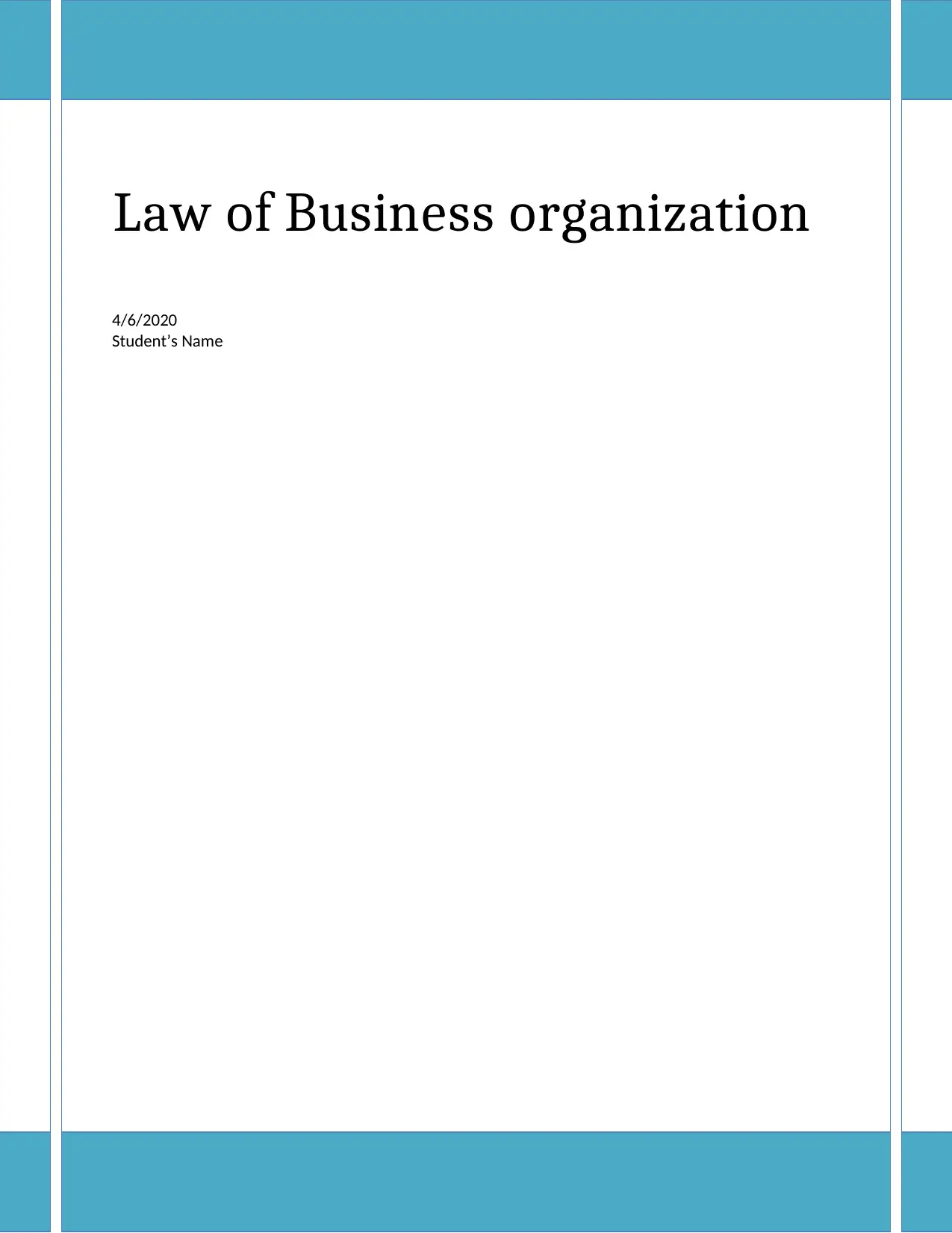
Running Head: BUSINESS AND CORPORATION LAW 0
Law of Business organization
4/6/2020
Student’s Name
Law of Business organization
4/6/2020
Student’s Name
Paraphrase This Document
Need a fresh take? Get an instant paraphrase of this document with our AI Paraphraser
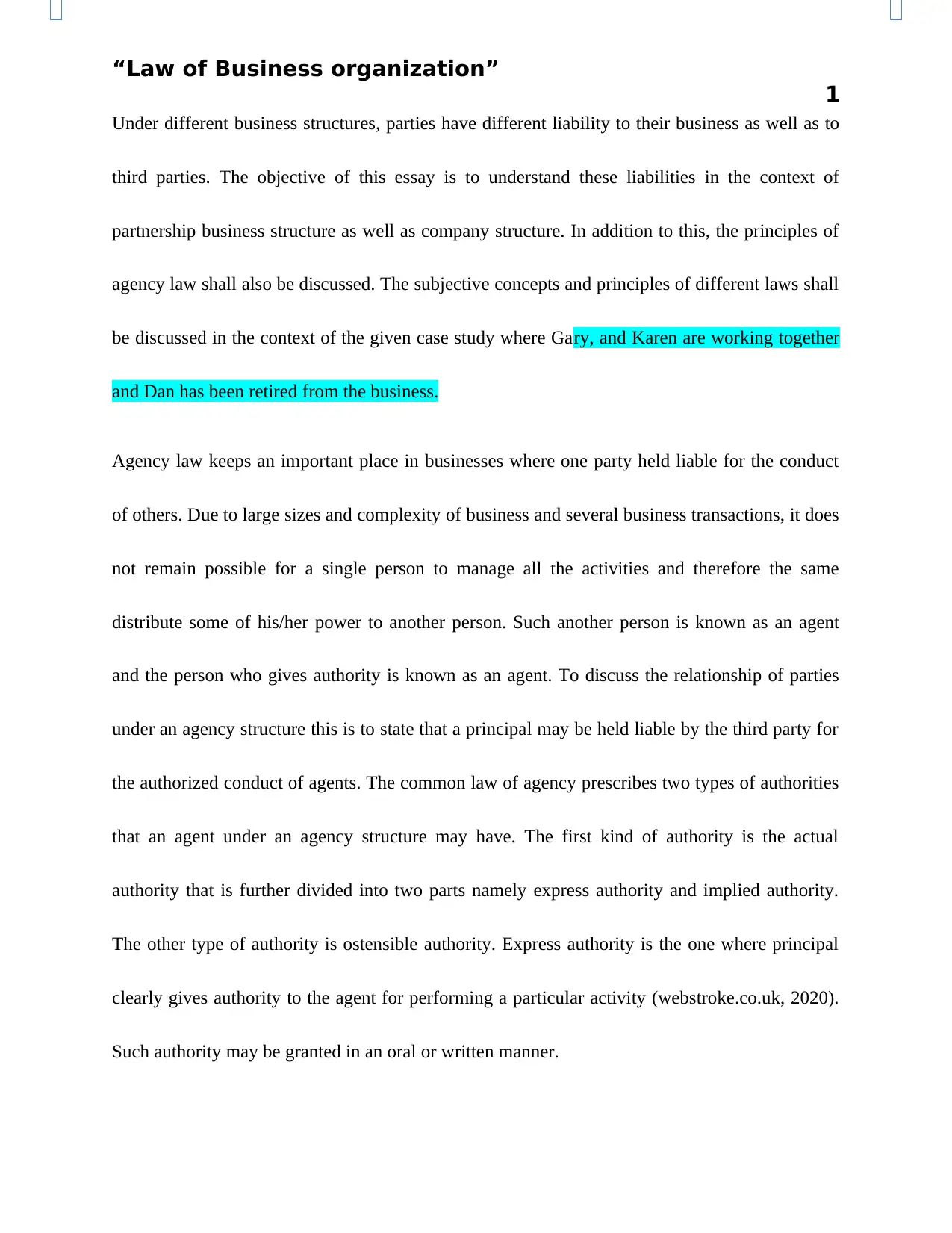
“Law of Business organization”
1
Under different business structures, parties have different liability to their business as well as to
third parties. The objective of this essay is to understand these liabilities in the context of
partnership business structure as well as company structure. In addition to this, the principles of
agency law shall also be discussed. The subjective concepts and principles of different laws shall
be discussed in the context of the given case study where Gary, and Karen are working together
and Dan has been retired from the business.
Agency law keeps an important place in businesses where one party held liable for the conduct
of others. Due to large sizes and complexity of business and several business transactions, it does
not remain possible for a single person to manage all the activities and therefore the same
distribute some of his/her power to another person. Such another person is known as an agent
and the person who gives authority is known as an agent. To discuss the relationship of parties
under an agency structure this is to state that a principal may be held liable by the third party for
the authorized conduct of agents. The common law of agency prescribes two types of authorities
that an agent under an agency structure may have. The first kind of authority is the actual
authority that is further divided into two parts namely express authority and implied authority.
The other type of authority is ostensible authority. Express authority is the one where principal
clearly gives authority to the agent for performing a particular activity (webstroke.co.uk, 2020).
Such authority may be granted in an oral or written manner.
1
Under different business structures, parties have different liability to their business as well as to
third parties. The objective of this essay is to understand these liabilities in the context of
partnership business structure as well as company structure. In addition to this, the principles of
agency law shall also be discussed. The subjective concepts and principles of different laws shall
be discussed in the context of the given case study where Gary, and Karen are working together
and Dan has been retired from the business.
Agency law keeps an important place in businesses where one party held liable for the conduct
of others. Due to large sizes and complexity of business and several business transactions, it does
not remain possible for a single person to manage all the activities and therefore the same
distribute some of his/her power to another person. Such another person is known as an agent
and the person who gives authority is known as an agent. To discuss the relationship of parties
under an agency structure this is to state that a principal may be held liable by the third party for
the authorized conduct of agents. The common law of agency prescribes two types of authorities
that an agent under an agency structure may have. The first kind of authority is the actual
authority that is further divided into two parts namely express authority and implied authority.
The other type of authority is ostensible authority. Express authority is the one where principal
clearly gives authority to the agent for performing a particular activity (webstroke.co.uk, 2020).
Such authority may be granted in an oral or written manner.
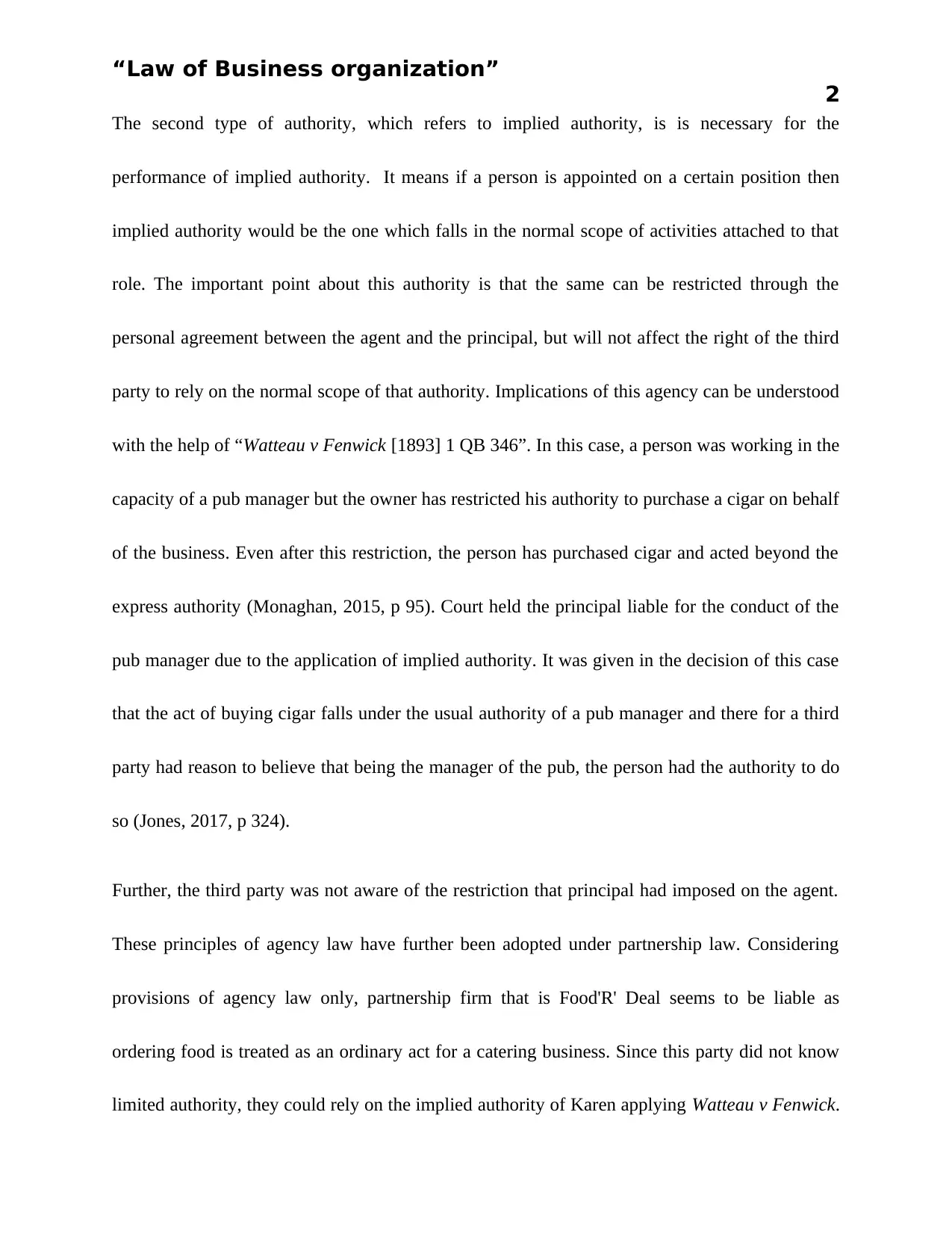
“Law of Business organization”
2
The second type of authority, which refers to implied authority, is is necessary for the
performance of implied authority. It means if a person is appointed on a certain position then
implied authority would be the one which falls in the normal scope of activities attached to that
role. The important point about this authority is that the same can be restricted through the
personal agreement between the agent and the principal, but will not affect the right of the third
party to rely on the normal scope of that authority. Implications of this agency can be understood
with the help of “Watteau v Fenwick [1893] 1 QB 346”. In this case, a person was working in the
capacity of a pub manager but the owner has restricted his authority to purchase a cigar on behalf
of the business. Even after this restriction, the person has purchased cigar and acted beyond the
express authority (Monaghan, 2015, p 95). Court held the principal liable for the conduct of the
pub manager due to the application of implied authority. It was given in the decision of this case
that the act of buying cigar falls under the usual authority of a pub manager and there for a third
party had reason to believe that being the manager of the pub, the person had the authority to do
so (Jones, 2017, p 324).
Further, the third party was not aware of the restriction that principal had imposed on the agent.
These principles of agency law have further been adopted under partnership law. Considering
provisions of agency law only, partnership firm that is Food'R' Deal seems to be liable as
ordering food is treated as an ordinary act for a catering business. Since this party did not know
limited authority, they could rely on the implied authority of Karen applying Watteau v Fenwick.
2
The second type of authority, which refers to implied authority, is is necessary for the
performance of implied authority. It means if a person is appointed on a certain position then
implied authority would be the one which falls in the normal scope of activities attached to that
role. The important point about this authority is that the same can be restricted through the
personal agreement between the agent and the principal, but will not affect the right of the third
party to rely on the normal scope of that authority. Implications of this agency can be understood
with the help of “Watteau v Fenwick [1893] 1 QB 346”. In this case, a person was working in the
capacity of a pub manager but the owner has restricted his authority to purchase a cigar on behalf
of the business. Even after this restriction, the person has purchased cigar and acted beyond the
express authority (Monaghan, 2015, p 95). Court held the principal liable for the conduct of the
pub manager due to the application of implied authority. It was given in the decision of this case
that the act of buying cigar falls under the usual authority of a pub manager and there for a third
party had reason to believe that being the manager of the pub, the person had the authority to do
so (Jones, 2017, p 324).
Further, the third party was not aware of the restriction that principal had imposed on the agent.
These principles of agency law have further been adopted under partnership law. Considering
provisions of agency law only, partnership firm that is Food'R' Deal seems to be liable as
ordering food is treated as an ordinary act for a catering business. Since this party did not know
limited authority, they could rely on the implied authority of Karen applying Watteau v Fenwick.
⊘ This is a preview!⊘
Do you want full access?
Subscribe today to unlock all pages.

Trusted by 1+ million students worldwide
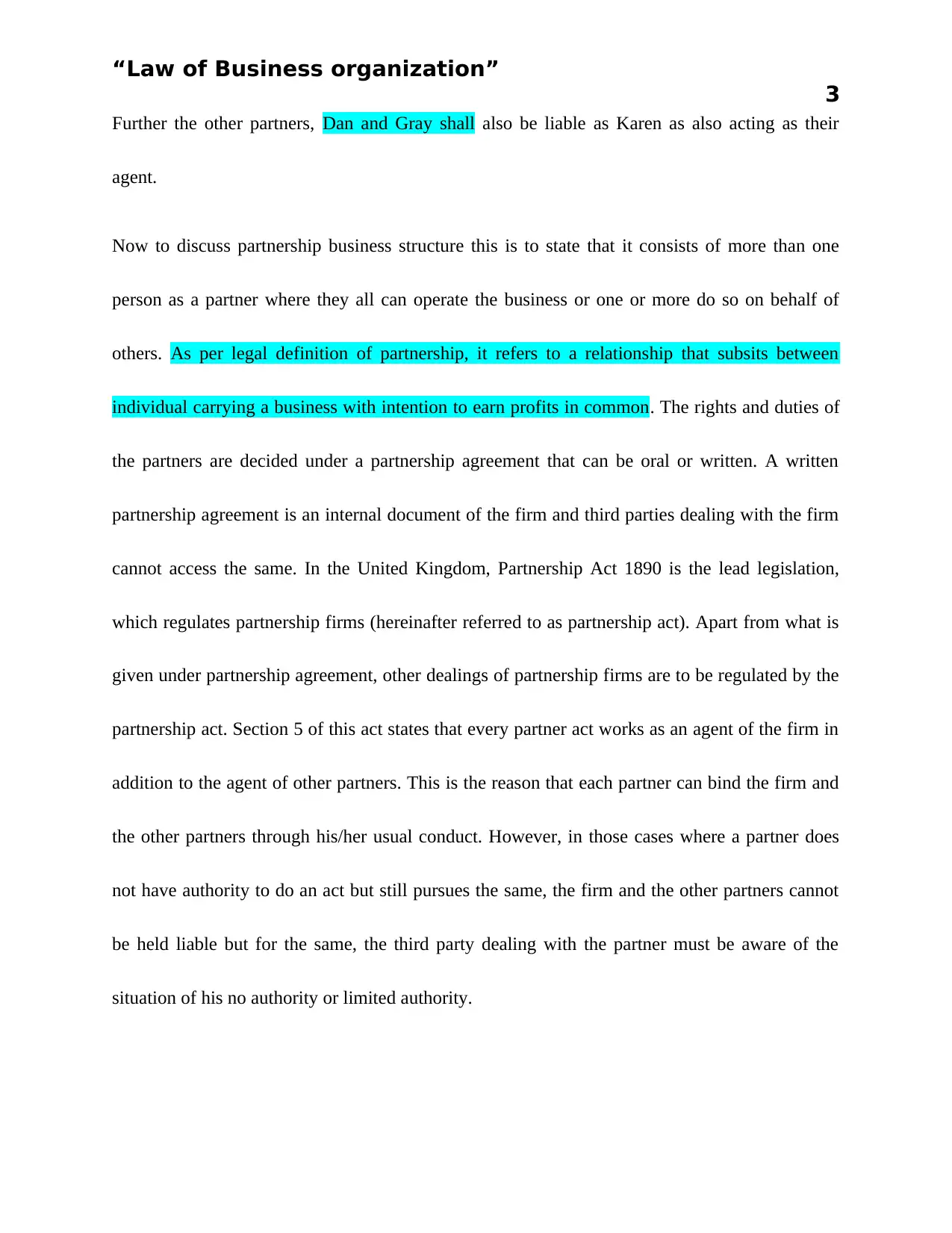
“Law of Business organization”
3
Further the other partners, Dan and Gray shall also be liable as Karen as also acting as their
agent.
Now to discuss partnership business structure this is to state that it consists of more than one
person as a partner where they all can operate the business or one or more do so on behalf of
others. As per legal definition of partnership, it refers to a relationship that subsits between
individual carrying a business with intention to earn profits in common. The rights and duties of
the partners are decided under a partnership agreement that can be oral or written. A written
partnership agreement is an internal document of the firm and third parties dealing with the firm
cannot access the same. In the United Kingdom, Partnership Act 1890 is the lead legislation,
which regulates partnership firms (hereinafter referred to as partnership act). Apart from what is
given under partnership agreement, other dealings of partnership firms are to be regulated by the
partnership act. Section 5 of this act states that every partner act works as an agent of the firm in
addition to the agent of other partners. This is the reason that each partner can bind the firm and
the other partners through his/her usual conduct. However, in those cases where a partner does
not have authority to do an act but still pursues the same, the firm and the other partners cannot
be held liable but for the same, the third party dealing with the partner must be aware of the
situation of his no authority or limited authority.
3
Further the other partners, Dan and Gray shall also be liable as Karen as also acting as their
agent.
Now to discuss partnership business structure this is to state that it consists of more than one
person as a partner where they all can operate the business or one or more do so on behalf of
others. As per legal definition of partnership, it refers to a relationship that subsits between
individual carrying a business with intention to earn profits in common. The rights and duties of
the partners are decided under a partnership agreement that can be oral or written. A written
partnership agreement is an internal document of the firm and third parties dealing with the firm
cannot access the same. In the United Kingdom, Partnership Act 1890 is the lead legislation,
which regulates partnership firms (hereinafter referred to as partnership act). Apart from what is
given under partnership agreement, other dealings of partnership firms are to be regulated by the
partnership act. Section 5 of this act states that every partner act works as an agent of the firm in
addition to the agent of other partners. This is the reason that each partner can bind the firm and
the other partners through his/her usual conduct. However, in those cases where a partner does
not have authority to do an act but still pursues the same, the firm and the other partners cannot
be held liable but for the same, the third party dealing with the partner must be aware of the
situation of his no authority or limited authority.
Paraphrase This Document
Need a fresh take? Get an instant paraphrase of this document with our AI Paraphraser
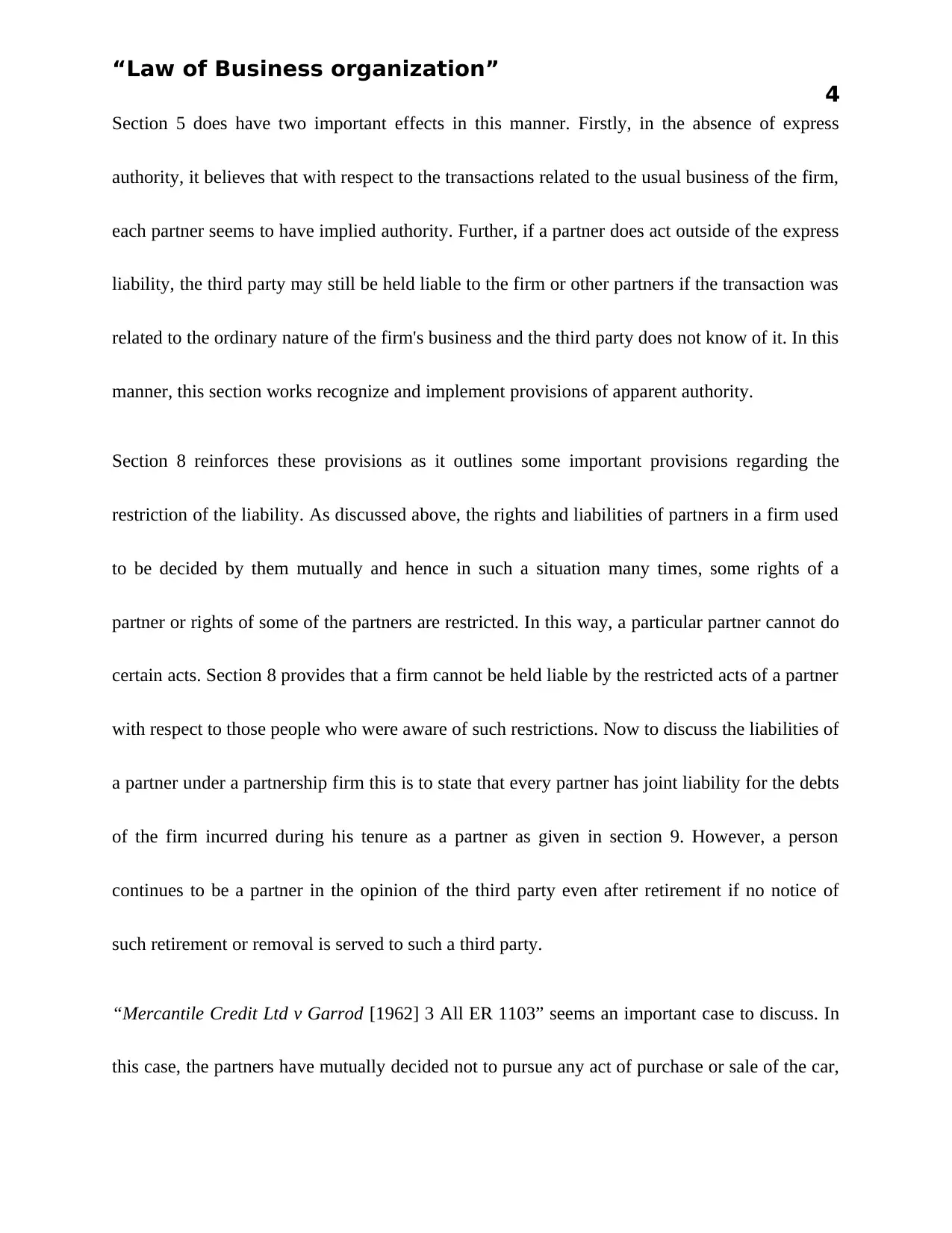
“Law of Business organization”
4
Section 5 does have two important effects in this manner. Firstly, in the absence of express
authority, it believes that with respect to the transactions related to the usual business of the firm,
each partner seems to have implied authority. Further, if a partner does act outside of the express
liability, the third party may still be held liable to the firm or other partners if the transaction was
related to the ordinary nature of the firm's business and the third party does not know of it. In this
manner, this section works recognize and implement provisions of apparent authority.
Section 8 reinforces these provisions as it outlines some important provisions regarding the
restriction of the liability. As discussed above, the rights and liabilities of partners in a firm used
to be decided by them mutually and hence in such a situation many times, some rights of a
partner or rights of some of the partners are restricted. In this way, a particular partner cannot do
certain acts. Section 8 provides that a firm cannot be held liable by the restricted acts of a partner
with respect to those people who were aware of such restrictions. Now to discuss the liabilities of
a partner under a partnership firm this is to state that every partner has joint liability for the debts
of the firm incurred during his tenure as a partner as given in section 9. However, a person
continues to be a partner in the opinion of the third party even after retirement if no notice of
such retirement or removal is served to such a third party.
“Mercantile Credit Ltd v Garrod [1962] 3 All ER 1103” seems an important case to discuss. In
this case, the partners have mutually decided not to pursue any act of purchase or sale of the car,
4
Section 5 does have two important effects in this manner. Firstly, in the absence of express
authority, it believes that with respect to the transactions related to the usual business of the firm,
each partner seems to have implied authority. Further, if a partner does act outside of the express
liability, the third party may still be held liable to the firm or other partners if the transaction was
related to the ordinary nature of the firm's business and the third party does not know of it. In this
manner, this section works recognize and implement provisions of apparent authority.
Section 8 reinforces these provisions as it outlines some important provisions regarding the
restriction of the liability. As discussed above, the rights and liabilities of partners in a firm used
to be decided by them mutually and hence in such a situation many times, some rights of a
partner or rights of some of the partners are restricted. In this way, a particular partner cannot do
certain acts. Section 8 provides that a firm cannot be held liable by the restricted acts of a partner
with respect to those people who were aware of such restrictions. Now to discuss the liabilities of
a partner under a partnership firm this is to state that every partner has joint liability for the debts
of the firm incurred during his tenure as a partner as given in section 9. However, a person
continues to be a partner in the opinion of the third party even after retirement if no notice of
such retirement or removal is served to such a third party.
“Mercantile Credit Ltd v Garrod [1962] 3 All ER 1103” seems an important case to discuss. In
this case, the partners have mutually decided not to pursue any act of purchase or sale of the car,
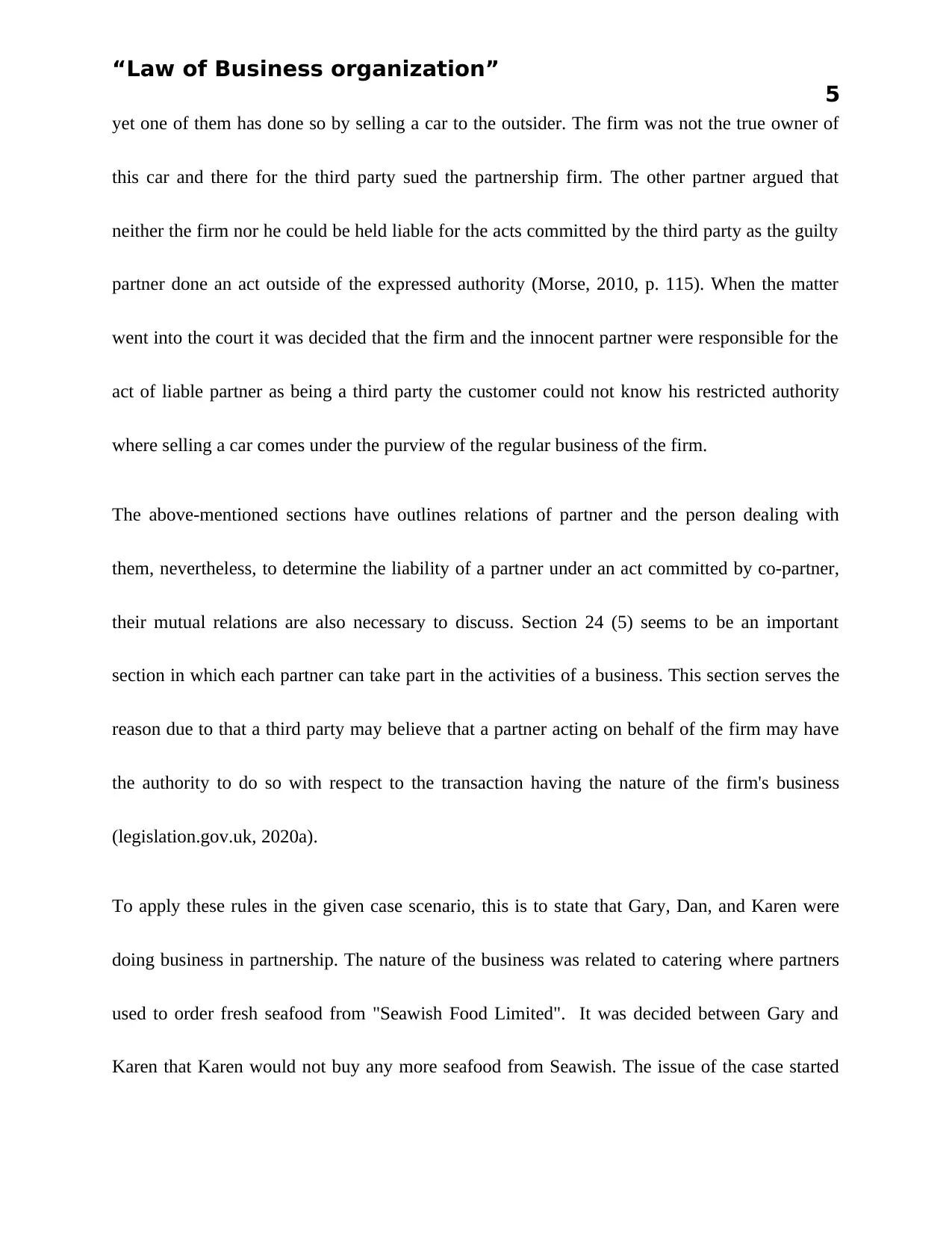
“Law of Business organization”
5
yet one of them has done so by selling a car to the outsider. The firm was not the true owner of
this car and there for the third party sued the partnership firm. The other partner argued that
neither the firm nor he could be held liable for the acts committed by the third party as the guilty
partner done an act outside of the expressed authority (Morse, 2010, p. 115). When the matter
went into the court it was decided that the firm and the innocent partner were responsible for the
act of liable partner as being a third party the customer could not know his restricted authority
where selling a car comes under the purview of the regular business of the firm.
The above-mentioned sections have outlines relations of partner and the person dealing with
them, nevertheless, to determine the liability of a partner under an act committed by co-partner,
their mutual relations are also necessary to discuss. Section 24 (5) seems to be an important
section in which each partner can take part in the activities of a business. This section serves the
reason due to that a third party may believe that a partner acting on behalf of the firm may have
the authority to do so with respect to the transaction having the nature of the firm's business
(legislation.gov.uk, 2020a).
To apply these rules in the given case scenario, this is to state that Gary, Dan, and Karen were
doing business in partnership. The nature of the business was related to catering where partners
used to order fresh seafood from "Seawish Food Limited". It was decided between Gary and
Karen that Karen would not buy any more seafood from Seawish. The issue of the case started
5
yet one of them has done so by selling a car to the outsider. The firm was not the true owner of
this car and there for the third party sued the partnership firm. The other partner argued that
neither the firm nor he could be held liable for the acts committed by the third party as the guilty
partner done an act outside of the expressed authority (Morse, 2010, p. 115). When the matter
went into the court it was decided that the firm and the innocent partner were responsible for the
act of liable partner as being a third party the customer could not know his restricted authority
where selling a car comes under the purview of the regular business of the firm.
The above-mentioned sections have outlines relations of partner and the person dealing with
them, nevertheless, to determine the liability of a partner under an act committed by co-partner,
their mutual relations are also necessary to discuss. Section 24 (5) seems to be an important
section in which each partner can take part in the activities of a business. This section serves the
reason due to that a third party may believe that a partner acting on behalf of the firm may have
the authority to do so with respect to the transaction having the nature of the firm's business
(legislation.gov.uk, 2020a).
To apply these rules in the given case scenario, this is to state that Gary, Dan, and Karen were
doing business in partnership. The nature of the business was related to catering where partners
used to order fresh seafood from "Seawish Food Limited". It was decided between Gary and
Karen that Karen would not buy any more seafood from Seawish. The issue of the case started
⊘ This is a preview!⊘
Do you want full access?
Subscribe today to unlock all pages.

Trusted by 1+ million students worldwide
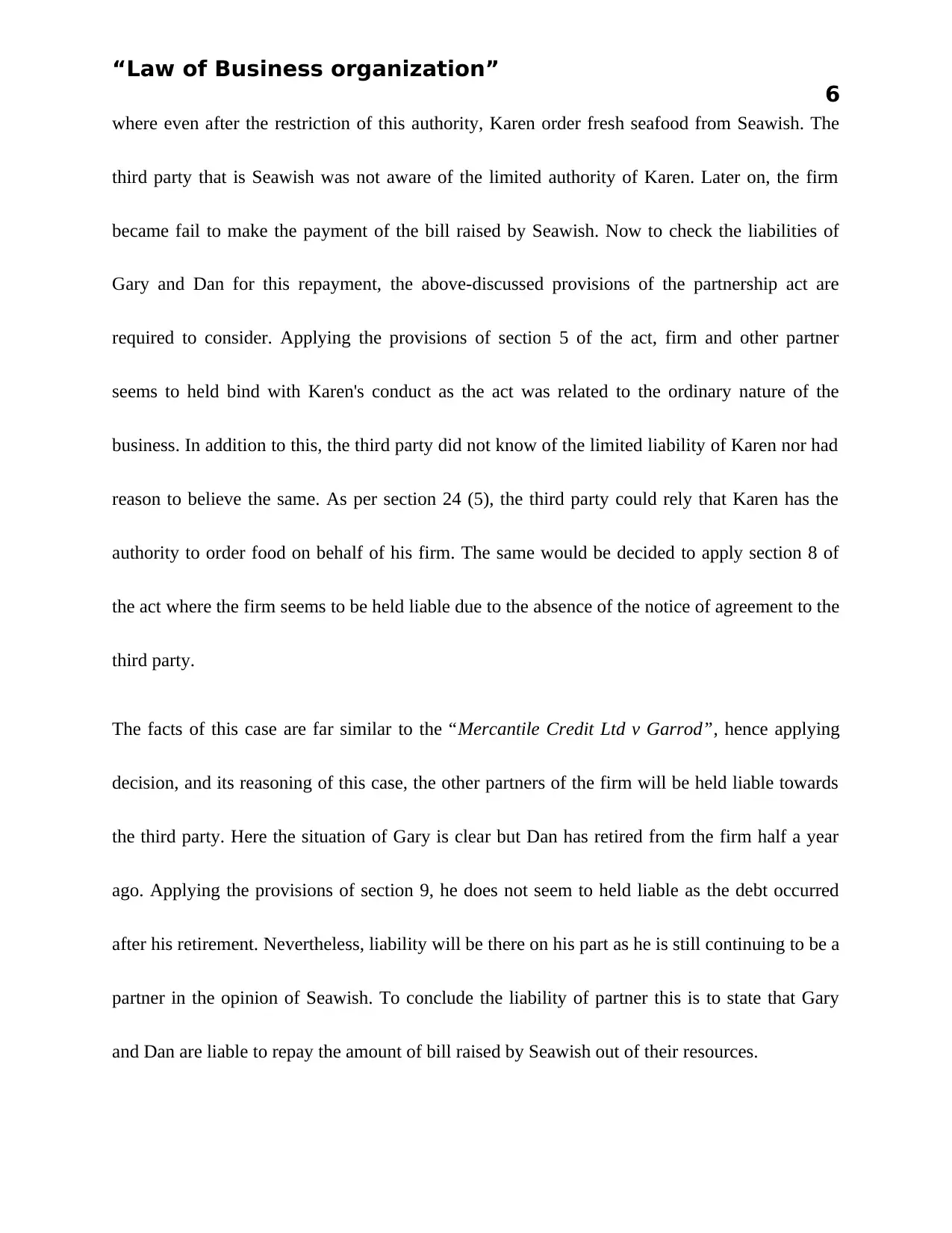
“Law of Business organization”
6
where even after the restriction of this authority, Karen order fresh seafood from Seawish. The
third party that is Seawish was not aware of the limited authority of Karen. Later on, the firm
became fail to make the payment of the bill raised by Seawish. Now to check the liabilities of
Gary and Dan for this repayment, the above-discussed provisions of the partnership act are
required to consider. Applying the provisions of section 5 of the act, firm and other partner
seems to held bind with Karen's conduct as the act was related to the ordinary nature of the
business. In addition to this, the third party did not know of the limited liability of Karen nor had
reason to believe the same. As per section 24 (5), the third party could rely that Karen has the
authority to order food on behalf of his firm. The same would be decided to apply section 8 of
the act where the firm seems to be held liable due to the absence of the notice of agreement to the
third party.
The facts of this case are far similar to the “Mercantile Credit Ltd v Garrod”, hence applying
decision, and its reasoning of this case, the other partners of the firm will be held liable towards
the third party. Here the situation of Gary is clear but Dan has retired from the firm half a year
ago. Applying the provisions of section 9, he does not seem to held liable as the debt occurred
after his retirement. Nevertheless, liability will be there on his part as he is still continuing to be a
partner in the opinion of Seawish. To conclude the liability of partner this is to state that Gary
and Dan are liable to repay the amount of bill raised by Seawish out of their resources.
6
where even after the restriction of this authority, Karen order fresh seafood from Seawish. The
third party that is Seawish was not aware of the limited authority of Karen. Later on, the firm
became fail to make the payment of the bill raised by Seawish. Now to check the liabilities of
Gary and Dan for this repayment, the above-discussed provisions of the partnership act are
required to consider. Applying the provisions of section 5 of the act, firm and other partner
seems to held bind with Karen's conduct as the act was related to the ordinary nature of the
business. In addition to this, the third party did not know of the limited liability of Karen nor had
reason to believe the same. As per section 24 (5), the third party could rely that Karen has the
authority to order food on behalf of his firm. The same would be decided to apply section 8 of
the act where the firm seems to be held liable due to the absence of the notice of agreement to the
third party.
The facts of this case are far similar to the “Mercantile Credit Ltd v Garrod”, hence applying
decision, and its reasoning of this case, the other partners of the firm will be held liable towards
the third party. Here the situation of Gary is clear but Dan has retired from the firm half a year
ago. Applying the provisions of section 9, he does not seem to held liable as the debt occurred
after his retirement. Nevertheless, liability will be there on his part as he is still continuing to be a
partner in the opinion of Seawish. To conclude the liability of partner this is to state that Gary
and Dan are liable to repay the amount of bill raised by Seawish out of their resources.
Paraphrase This Document
Need a fresh take? Get an instant paraphrase of this document with our AI Paraphraser
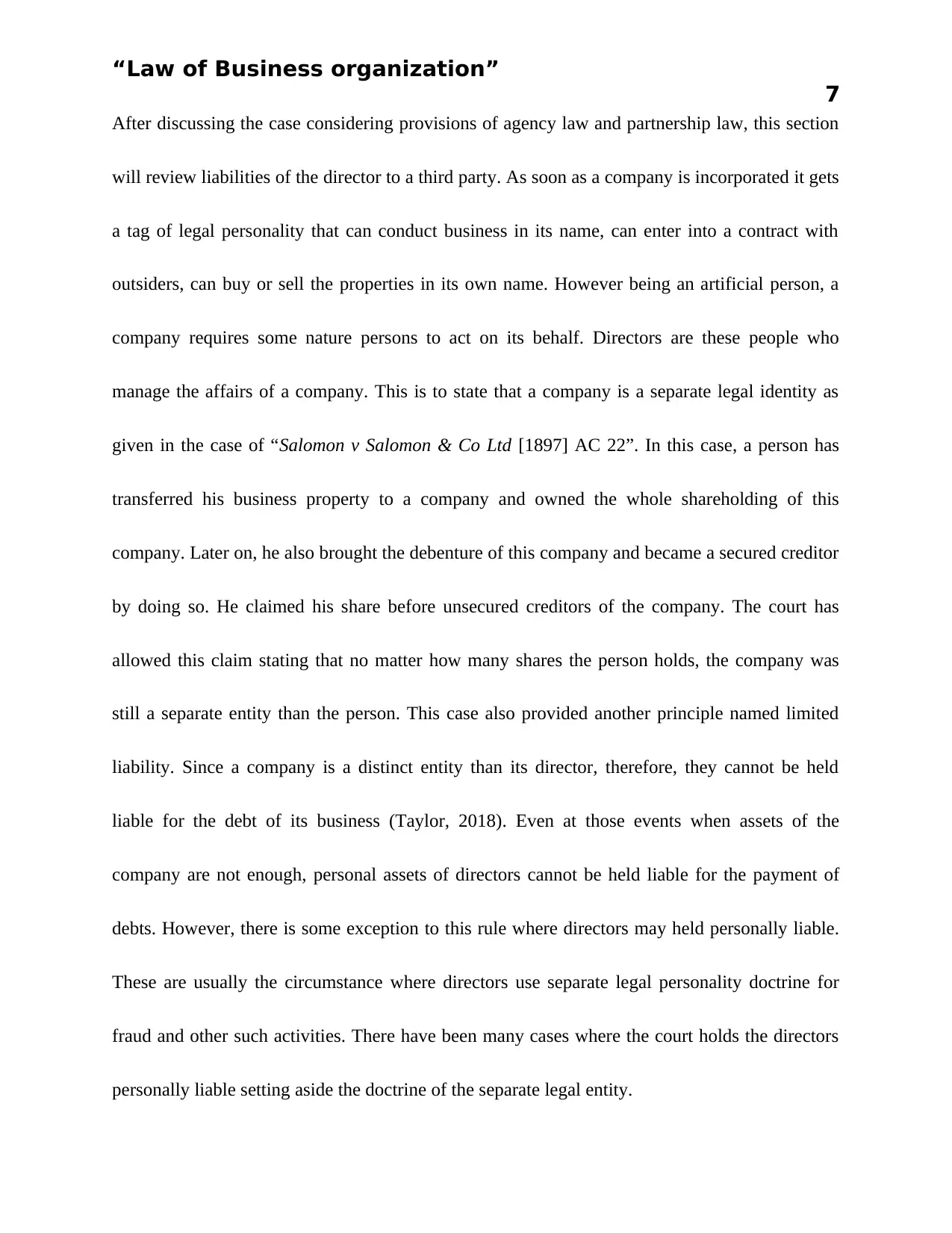
“Law of Business organization”
7
After discussing the case considering provisions of agency law and partnership law, this section
will review liabilities of the director to a third party. As soon as a company is incorporated it gets
a tag of legal personality that can conduct business in its name, can enter into a contract with
outsiders, can buy or sell the properties in its own name. However being an artificial person, a
company requires some nature persons to act on its behalf. Directors are these people who
manage the affairs of a company. This is to state that a company is a separate legal identity as
given in the case of “Salomon v Salomon & Co Ltd [1897] AC 22”. In this case, a person has
transferred his business property to a company and owned the whole shareholding of this
company. Later on, he also brought the debenture of this company and became a secured creditor
by doing so. He claimed his share before unsecured creditors of the company. The court has
allowed this claim stating that no matter how many shares the person holds, the company was
still a separate entity than the person. This case also provided another principle named limited
liability. Since a company is a distinct entity than its director, therefore, they cannot be held
liable for the debt of its business (Taylor, 2018). Even at those events when assets of the
company are not enough, personal assets of directors cannot be held liable for the payment of
debts. However, there is some exception to this rule where directors may held personally liable.
These are usually the circumstance where directors use separate legal personality doctrine for
fraud and other such activities. There have been many cases where the court holds the directors
personally liable setting aside the doctrine of the separate legal entity.
7
After discussing the case considering provisions of agency law and partnership law, this section
will review liabilities of the director to a third party. As soon as a company is incorporated it gets
a tag of legal personality that can conduct business in its name, can enter into a contract with
outsiders, can buy or sell the properties in its own name. However being an artificial person, a
company requires some nature persons to act on its behalf. Directors are these people who
manage the affairs of a company. This is to state that a company is a separate legal identity as
given in the case of “Salomon v Salomon & Co Ltd [1897] AC 22”. In this case, a person has
transferred his business property to a company and owned the whole shareholding of this
company. Later on, he also brought the debenture of this company and became a secured creditor
by doing so. He claimed his share before unsecured creditors of the company. The court has
allowed this claim stating that no matter how many shares the person holds, the company was
still a separate entity than the person. This case also provided another principle named limited
liability. Since a company is a distinct entity than its director, therefore, they cannot be held
liable for the debt of its business (Taylor, 2018). Even at those events when assets of the
company are not enough, personal assets of directors cannot be held liable for the payment of
debts. However, there is some exception to this rule where directors may held personally liable.
These are usually the circumstance where directors use separate legal personality doctrine for
fraud and other such activities. There have been many cases where the court holds the directors
personally liable setting aside the doctrine of the separate legal entity.
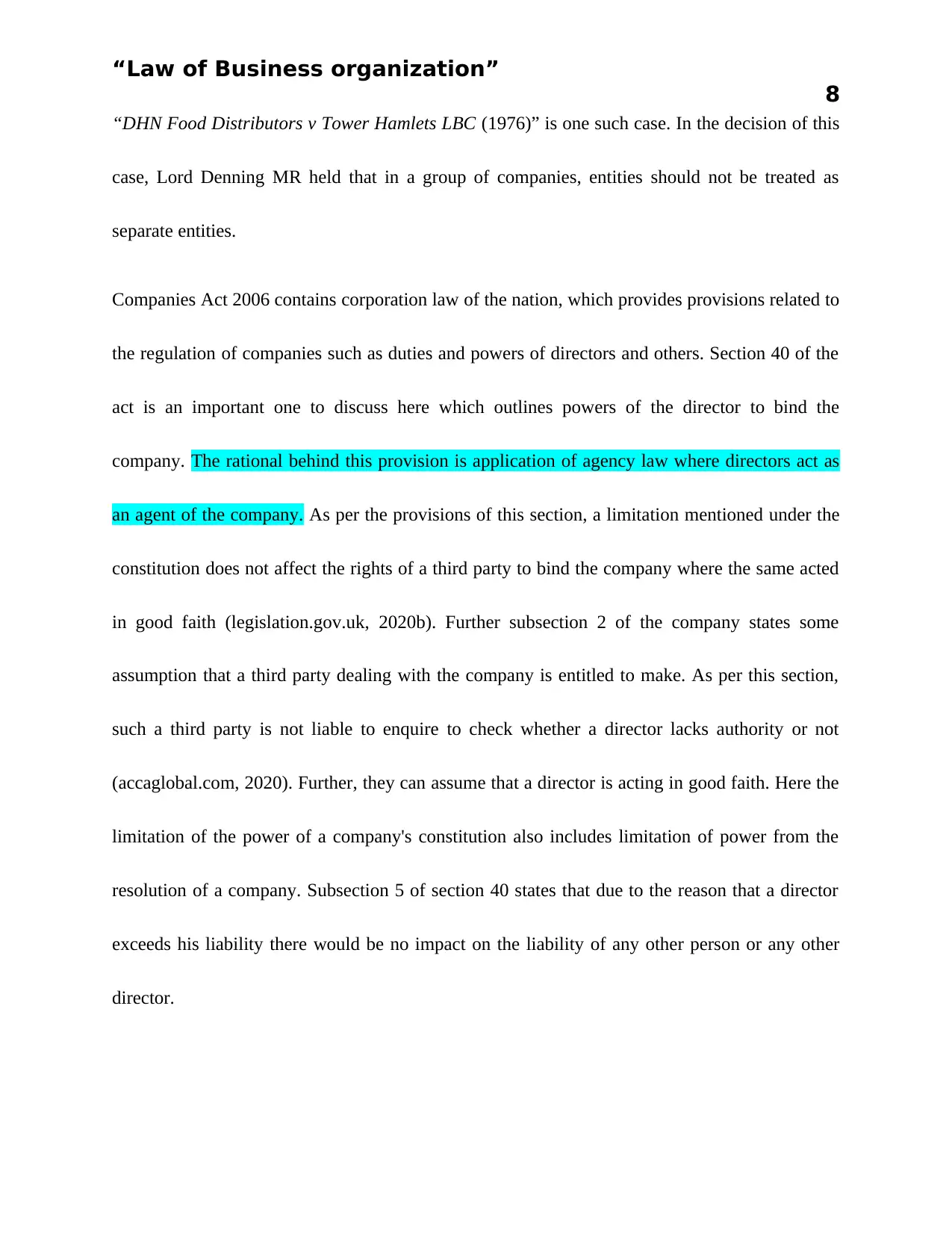
“Law of Business organization”
8
“DHN Food Distributors v Tower Hamlets LBC (1976)” is one such case. In the decision of this
case, Lord Denning MR held that in a group of companies, entities should not be treated as
separate entities.
Companies Act 2006 contains corporation law of the nation, which provides provisions related to
the regulation of companies such as duties and powers of directors and others. Section 40 of the
act is an important one to discuss here which outlines powers of the director to bind the
company. The rational behind this provision is application of agency law where directors act as
an agent of the company. As per the provisions of this section, a limitation mentioned under the
constitution does not affect the rights of a third party to bind the company where the same acted
in good faith (legislation.gov.uk, 2020b). Further subsection 2 of the company states some
assumption that a third party dealing with the company is entitled to make. As per this section,
such a third party is not liable to enquire to check whether a director lacks authority or not
(accaglobal.com, 2020). Further, they can assume that a director is acting in good faith. Here the
limitation of the power of a company's constitution also includes limitation of power from the
resolution of a company. Subsection 5 of section 40 states that due to the reason that a director
exceeds his liability there would be no impact on the liability of any other person or any other
director.
8
“DHN Food Distributors v Tower Hamlets LBC (1976)” is one such case. In the decision of this
case, Lord Denning MR held that in a group of companies, entities should not be treated as
separate entities.
Companies Act 2006 contains corporation law of the nation, which provides provisions related to
the regulation of companies such as duties and powers of directors and others. Section 40 of the
act is an important one to discuss here which outlines powers of the director to bind the
company. The rational behind this provision is application of agency law where directors act as
an agent of the company. As per the provisions of this section, a limitation mentioned under the
constitution does not affect the rights of a third party to bind the company where the same acted
in good faith (legislation.gov.uk, 2020b). Further subsection 2 of the company states some
assumption that a third party dealing with the company is entitled to make. As per this section,
such a third party is not liable to enquire to check whether a director lacks authority or not
(accaglobal.com, 2020). Further, they can assume that a director is acting in good faith. Here the
limitation of the power of a company's constitution also includes limitation of power from the
resolution of a company. Subsection 5 of section 40 states that due to the reason that a director
exceeds his liability there would be no impact on the liability of any other person or any other
director.
⊘ This is a preview!⊘
Do you want full access?
Subscribe today to unlock all pages.

Trusted by 1+ million students worldwide
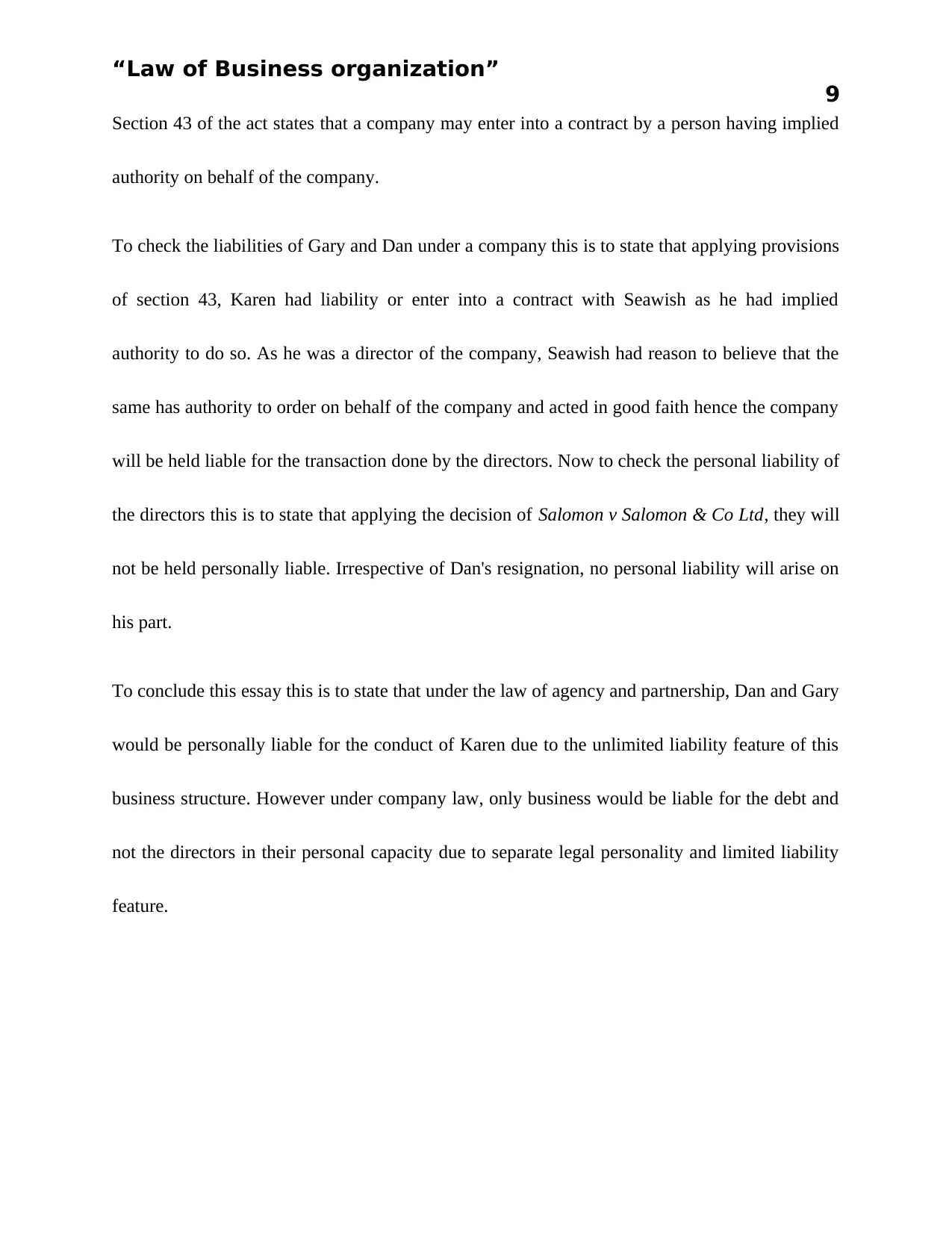
“Law of Business organization”
9
Section 43 of the act states that a company may enter into a contract by a person having implied
authority on behalf of the company.
To check the liabilities of Gary and Dan under a company this is to state that applying provisions
of section 43, Karen had liability or enter into a contract with Seawish as he had implied
authority to do so. As he was a director of the company, Seawish had reason to believe that the
same has authority to order on behalf of the company and acted in good faith hence the company
will be held liable for the transaction done by the directors. Now to check the personal liability of
the directors this is to state that applying the decision of Salomon v Salomon & Co Ltd, they will
not be held personally liable. Irrespective of Dan's resignation, no personal liability will arise on
his part.
To conclude this essay this is to state that under the law of agency and partnership, Dan and Gary
would be personally liable for the conduct of Karen due to the unlimited liability feature of this
business structure. However under company law, only business would be liable for the debt and
not the directors in their personal capacity due to separate legal personality and limited liability
feature.
9
Section 43 of the act states that a company may enter into a contract by a person having implied
authority on behalf of the company.
To check the liabilities of Gary and Dan under a company this is to state that applying provisions
of section 43, Karen had liability or enter into a contract with Seawish as he had implied
authority to do so. As he was a director of the company, Seawish had reason to believe that the
same has authority to order on behalf of the company and acted in good faith hence the company
will be held liable for the transaction done by the directors. Now to check the personal liability of
the directors this is to state that applying the decision of Salomon v Salomon & Co Ltd, they will
not be held personally liable. Irrespective of Dan's resignation, no personal liability will arise on
his part.
To conclude this essay this is to state that under the law of agency and partnership, Dan and Gary
would be personally liable for the conduct of Karen due to the unlimited liability feature of this
business structure. However under company law, only business would be liable for the debt and
not the directors in their personal capacity due to separate legal personality and limited liability
feature.
Paraphrase This Document
Need a fresh take? Get an instant paraphrase of this document with our AI Paraphraser
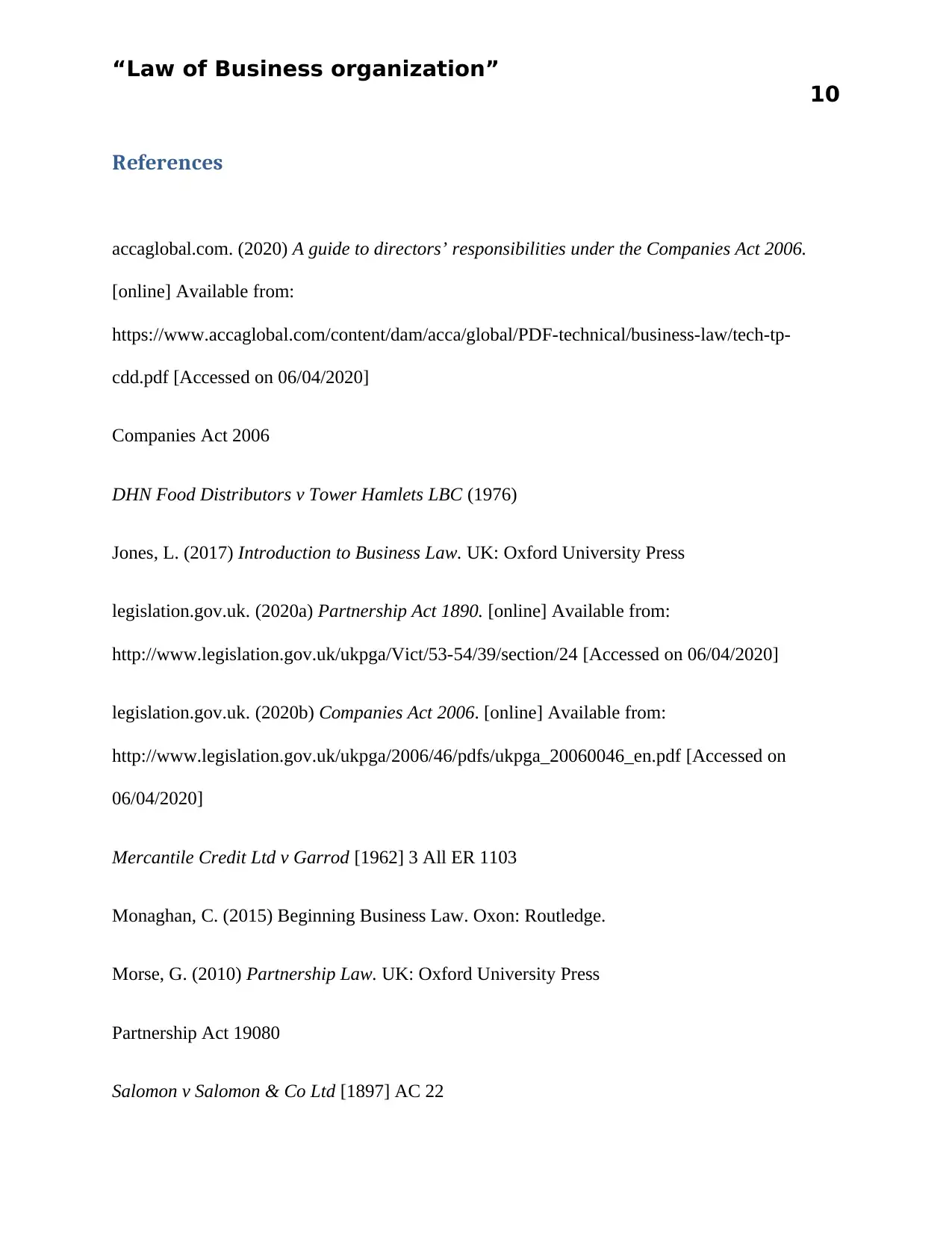
“Law of Business organization”
10
References
accaglobal.com. (2020) A guide to directors’ responsibilities under the Companies Act 2006.
[online] Available from:
https://www.accaglobal.com/content/dam/acca/global/PDF-technical/business-law/tech-tp-
cdd.pdf [Accessed on 06/04/2020]
Companies Act 2006
DHN Food Distributors v Tower Hamlets LBC (1976)
Jones, L. (2017) Introduction to Business Law. UK: Oxford University Press
legislation.gov.uk. (2020a) Partnership Act 1890. [online] Available from:
http://www.legislation.gov.uk/ukpga/Vict/53-54/39/section/24 [Accessed on 06/04/2020]
legislation.gov.uk. (2020b) Companies Act 2006. [online] Available from:
http://www.legislation.gov.uk/ukpga/2006/46/pdfs/ukpga_20060046_en.pdf [Accessed on
06/04/2020]
Mercantile Credit Ltd v Garrod [1962] 3 All ER 1103
Monaghan, C. (2015) Beginning Business Law. Oxon: Routledge.
Morse, G. (2010) Partnership Law. UK: Oxford University Press
Partnership Act 19080
Salomon v Salomon & Co Ltd [1897] AC 22
10
References
accaglobal.com. (2020) A guide to directors’ responsibilities under the Companies Act 2006.
[online] Available from:
https://www.accaglobal.com/content/dam/acca/global/PDF-technical/business-law/tech-tp-
cdd.pdf [Accessed on 06/04/2020]
Companies Act 2006
DHN Food Distributors v Tower Hamlets LBC (1976)
Jones, L. (2017) Introduction to Business Law. UK: Oxford University Press
legislation.gov.uk. (2020a) Partnership Act 1890. [online] Available from:
http://www.legislation.gov.uk/ukpga/Vict/53-54/39/section/24 [Accessed on 06/04/2020]
legislation.gov.uk. (2020b) Companies Act 2006. [online] Available from:
http://www.legislation.gov.uk/ukpga/2006/46/pdfs/ukpga_20060046_en.pdf [Accessed on
06/04/2020]
Mercantile Credit Ltd v Garrod [1962] 3 All ER 1103
Monaghan, C. (2015) Beginning Business Law. Oxon: Routledge.
Morse, G. (2010) Partnership Law. UK: Oxford University Press
Partnership Act 19080
Salomon v Salomon & Co Ltd [1897] AC 22
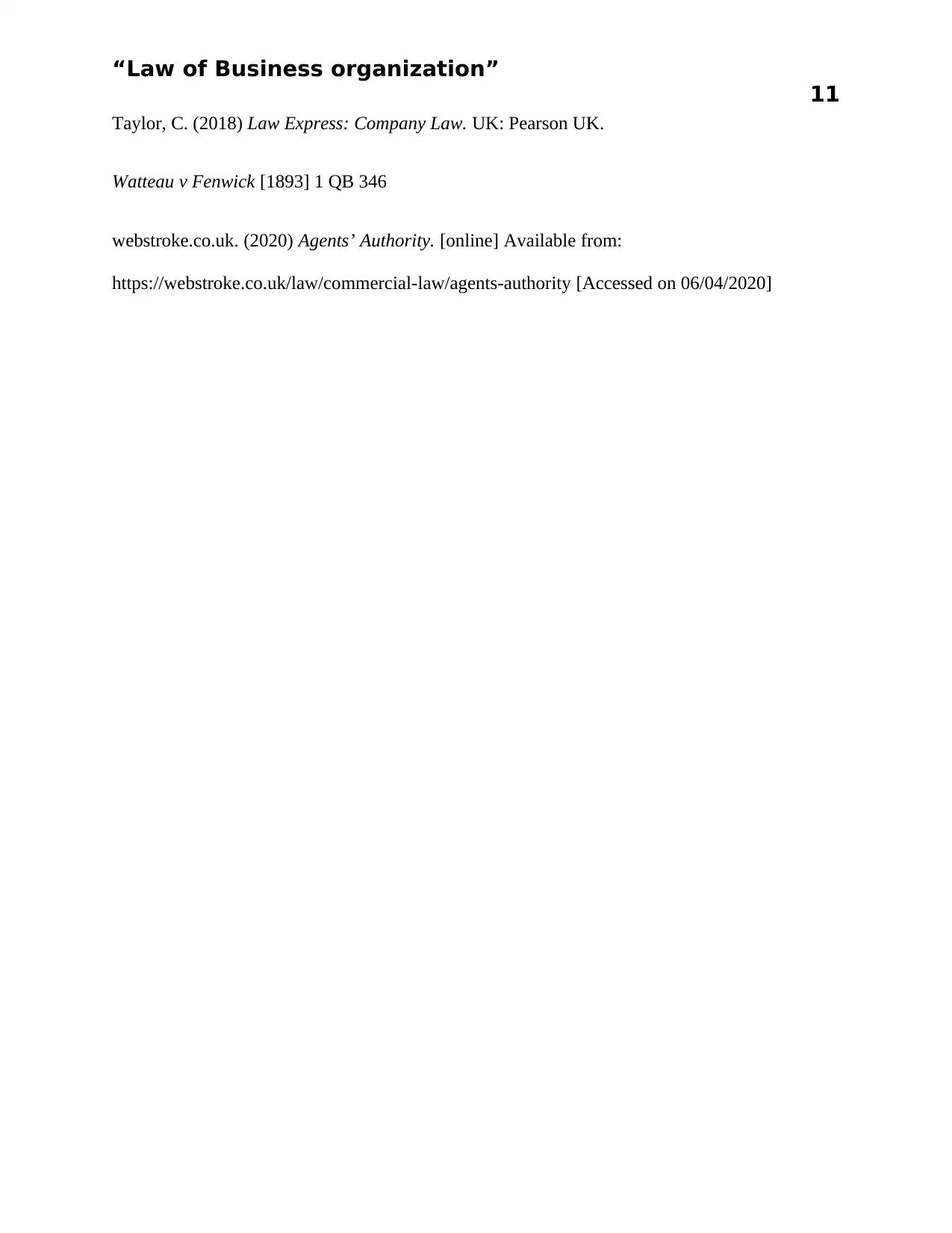
“Law of Business organization”
11
Taylor, C. (2018) Law Express: Company Law. UK: Pearson UK.
Watteau v Fenwick [1893] 1 QB 346
webstroke.co.uk. (2020) Agents’ Authority. [online] Available from:
https://webstroke.co.uk/law/commercial-law/agents-authority [Accessed on 06/04/2020]
11
Taylor, C. (2018) Law Express: Company Law. UK: Pearson UK.
Watteau v Fenwick [1893] 1 QB 346
webstroke.co.uk. (2020) Agents’ Authority. [online] Available from:
https://webstroke.co.uk/law/commercial-law/agents-authority [Accessed on 06/04/2020]
⊘ This is a preview!⊘
Do you want full access?
Subscribe today to unlock all pages.

Trusted by 1+ million students worldwide
1 out of 12
Related Documents
Your All-in-One AI-Powered Toolkit for Academic Success.
+13062052269
info@desklib.com
Available 24*7 on WhatsApp / Email
![[object Object]](/_next/static/media/star-bottom.7253800d.svg)
Unlock your academic potential
Copyright © 2020–2026 A2Z Services. All Rights Reserved. Developed and managed by ZUCOL.





